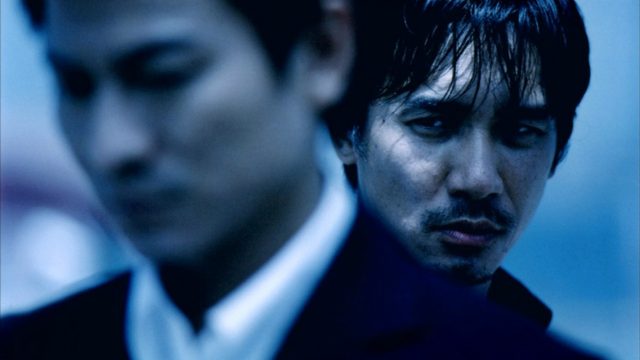I still haven’t seen The Departed.
I’m sure it’s good, or at least competent, and it won four Academy Awards, including Best Adapted Screenplay and of course Best Picture.
But the thing is, there’s a damn close to perfect movie out there, and it’s called Infernal Affairs, and damned if I can see the point of watching a remake. Especially when the original didn’t even get a Best Foreign Language nomination. (Stupid Oscars.)
Is this petty? It absolutely is, but in my defense, Infernal Affairs stars the absolutely stellar Andy Lau and Tony Leung, uses its mobster-versus-cop-versus-self storyline to tap into Hong Kong’s anxieties at the turn of the millennium, and begins and ends with Buddhist meditations on the nature of suffering and what, for the sake of expediency, we’ll call hell. It’s just not going to be the same when it’s set in Boston and co-stars a guy who owns a burger chain.*
But I come not to bury The Departed but to praise Infernal Affairs, a high-wire act of a film that combines the pulpy pleasures of the best Hong Kong action with a thrilling cat-and-mouse game between two men who fill the roles of both mouse and cat. A viewer can’t watch many movies from the golden age of Hong Kong cinema without running into the we’re not so different, you and I cliche. Chow-Yun Fat alone has dozens of movies that riff on the theme (sometimes he’s the protagonist, sometimes the antagonist, sometimes the criminal, sometimes the cop).
But Infernal Affairs takes this to another level, giving us two adversaries so deep in their undercover lives that they have almost wholly lost themselves. Lau and Leung are miserable, trapped by their own successes. Annihilation is the only escape they can see — either they die, or they lose almost everyone they know and the identities they’ve had for most of their adult lives. They are trapped, and due to both the circumstances of the film and their own choices, they remain trapped. At the end, they can hardly even trust themselves after ten years of lying.
Buddhism doesn’t have the kind of hell Westerners talk about, either the cartoon one with devils poking souls trapped in pots of boiling lava or the more creative ones envisioned by the likes of Milton, with special areas of punishment for the people who get on your nerves the most. Suffering, in Buddhism, is inevitable; it’s how an individual chooses to handle a life filled with suffering that makes the difference. The people who end up in hell (or Naraka) have chosen a prison of their own making, and the choices they make are what keeps them there. That is where Lau and Leung begin, and where they end. That one of them doesn’t survive to the final frame hardly seems to matter. Buddhism, after all, believes in reincarnation: death is just the path to another cycle.
* There is, of course, something to be said for changing both the setting and the religious themes when remaking a movie from a different culture. It’s often the only way to make an adaptation work at all. But something is inevitably lost, even as other ideas can be explored and improvements made.

